Mediterranean spices stay fresh for centuries due to a combination of smart storage techniques and natural climate advantages. You'll find that ancient civilizations mastered preservation using clay vessels, which regulate humidity and temperature perfectly. When you pair these containers with the region's naturally low humidity and mild temperatures, you've got ideal conditions for long-term spice storage. The spices themselves contain natural antimicrobial compounds like essential oils and phenols, while traditional drying and roasting methods lock in these preservative properties. The Mediterranean's time-tested preservation secrets extend far beyond simple storage methods.
Ancient Mediterranean Storage Techniques
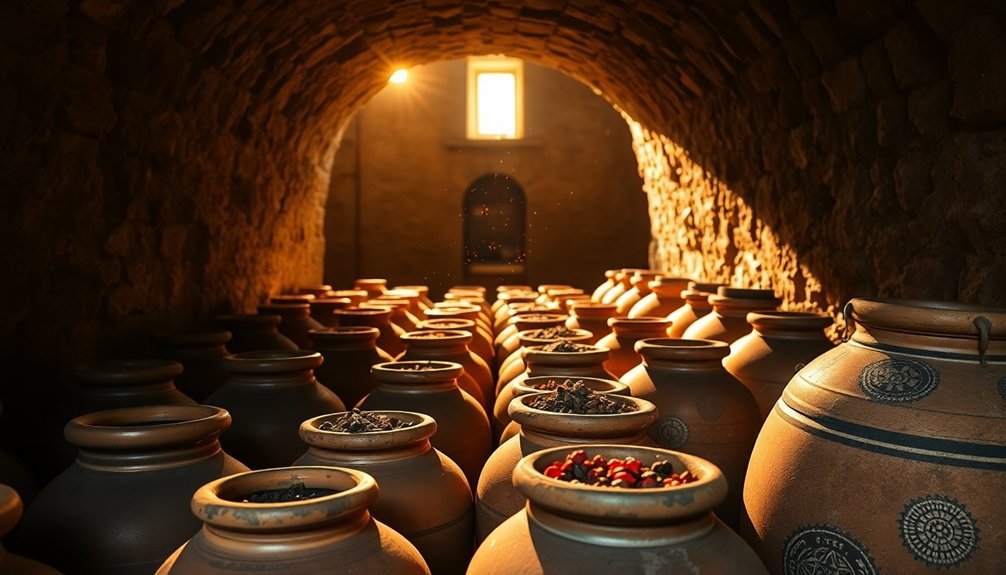
Ancient Mediterranean spice storage reflected the immense value placed on these precious commodities. You'll find that both Egyptians and Romans developed sophisticated methods to preserve their spices' potency and protect their investment.
The Egyptians relied on clay pots and jars, storing them in cool, dark spaces to maintain freshness, while wealthy Romans displayed their status through ornate boxes crafted from wood, metal, or ceramic. These spices were so valuable that they were often used as a form of currency in ancient trade.
You'd see these storage practices evolve as trade routes expanded, with merchants adapting durable containers for long journeys across the Mediterranean. The Romans' beautifully decorated spice containers weren't just practical – they symbolized the exotic origin and high value of spices like pepper, cassia, and cinnamon from Eastern regions.
To maintain freshness, you'll notice consistent principles across these ancient civilizations. They understood the importance of airtight storage, protection from heat and sunlight, and keeping containers dry.
Whether you're looking at Egyptian clay pots or Roman decorative boxes, you'll find they avoided metal containers for acidic spices and prioritized cool, dark storage locations to maximize preservation. These fundamental techniques proved so effective that they're still relevant today.
Natural Preservation Methods
Ancient Mediterranean cultures mastered natural preservation techniques that you'll find fascinating, including the strategic use of salt-packed clay vessels to store spices and herbs.
You'd have seen merchants using climate-controlled amphoras and terracotta containers, which maintained ideal temperatures and humidity levels for preserving valuable spices.
The most effective storage methods combined air-tight sealing techniques with natural antimicrobial agents like salt and herbs, creating an environment that kept spices fresh for months or even years. Today, these principles are still applied, with experts recommending cool, dark storage to maintain spice potency.
Ancient Salt Storage Techniques
Throughout the Mediterranean region, civilizations developed sophisticated salt preservation methods that revolutionized food storage and trade. You'll find that ancient Romans and Egyptians mastered these techniques, creating methods you can still observe in modern preservation practices.
When you're preserving food with salt, you're actually using the same principles these civilizations discovered thousands of years ago. These methods helped ensure food availability during times when fresh ingredients were scarce.
If you're curious about how they did it, there were two primary methods: direct curing and brining. In direct curing, you'd coat your food with pure salt, often mixed with spices, which draws out moisture and prevents spoilage.
With brining, you'd soak your food in saltwater solutions, a technique that's particularly effective for preserving olives, capers, and various meats.
You're actually witnessing osmosis at work when you use these methods. The salt creates an environment where harmful bacteria can't survive, while beneficial bacteria thrive, enhancing flavors.
The ancient Egyptians even used natron, a natural salt mixture, while Romans created garum, a valuable fermented fish sauce that became an essential trade commodity.
These preservation techniques weren't just about survival – they transformed Mediterranean cuisine and commerce.
Climate-Controlled Clay Vessels
In line with traditional Mediterranean practices, clay vessels emerged as one of the most effective natural methods for preserving spices. You'll find that these porous containers naturally regulate humidity while keeping your spices cool and dark – perfect conditions for maintaining their potency.
When you store your spices in clay vessels, you're fundamentally creating a microclimate that prevents moisture absorption while protecting essential oils from degradation.
Unlike plastic containers, clay vessels work similarly to glass in preserving your spices' aromatic compounds. You won't lose more than 5% of essential oils over five years if you're using properly sealed containers, compared to the 47% loss you'd experience with paper bags.
To maximize preservation, you'll want to place your clay vessels in cool, dark areas away from heat sources like grills or steam-producing appliances.
When you're handling spices in clay vessels, always use a dry spoon to prevent moisture infiltration. Don't sprinkle spices directly from the container into steaming pots, as the rising steam can introduce unwanted moisture.
Remember to dry your herbs and spices completely before storing them to prevent mold growth and maintain their Mediterranean flavors.
Air-Tight Sealing Methods
Beyond clay vessels, proper air-tight sealing stands as a cornerstone of Mediterranean spice preservation. You'll want to select containers that provide a complete seal – glass jars with tight-fitting lids, metal tins, or ceramic vessels work exceptionally well.
Before storing your spices, verify your containers are completely dry and haven't previously held other substances that could contaminate the flavors.
You'll need to maintain specific storage conditions to enhance preservation. Keep your spices in a cool, dry place away from direct sunlight and heat sources. A dark pantry or dedicated spice drawer offers ideal protection from light exposure, which can degrade essential oils.
When handling your spices, always use dry utensils to prevent moisture introduction. Don't use wet measuring spoons or your fingers, as this can compromise the spices' integrity.
For best results, you'll want to divide larger quantities into smaller containers for daily use, keeping the bulk of your spices sealed away.
Consider buying whole spices and grinding them as needed – they'll last longer this way. While ground spices typically maintain peak flavor for six months, proper sealing methods can extend their usability well beyond this timeframe.
Traditional Spice Drying Practices
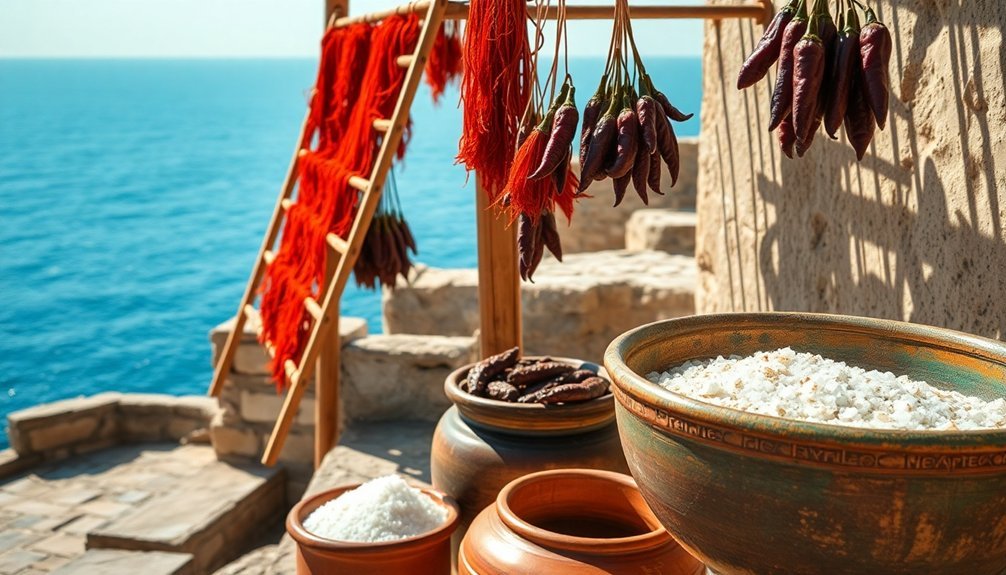
Traditional Mediterranean spice drying techniques have evolved over centuries to preserve the intense flavors and aromatic compounds of regional herbs and spices. You'll find that air-drying remains the most reliable method, where you'll need to hang small bundles of herbs or spices upside down in a dark, well-ventilated space. By keeping them away from sunlight, you're protecting their essential oils from breaking down.
While oven-drying offers a quicker alternative, you'll want to use it sparingly as it can diminish flavor intensity. If you choose this method, remember to keep your oven at its lowest setting and the door slightly open for proper air circulation. You'll need to spread your spices in a single layer and turn them periodically for even drying.
For enhanced preservation, you can incorporate salt-based techniques. You'll find that salt curing whole spices like peppercorns proves particularly effective, while salt packing herbs creates a protective barrier that draws out moisture.
When your herbs or spices become crisp and easily breakable, typically after about two weeks of air-drying, you'll know they're ready for storage.
Climate's Role in Longevity
These ancient drying methods work hand-in-hand with the Mediterranean climate to shape both spice preservation and usage patterns.
You'll find that the region's mild to warm temperatures have naturally guided locals toward incorporating specific spices that not only preserve food but also promote longevity.
When you examine the Mediterranean diet, you'll notice how climate-influenced spice choices have created a perfect storm of health benefits.
The warm climate encourages the use of antibacterial spices like garlic, oregano, and basil, which do more than just prevent food spoilage – they're packed with compounds that support heart health and combat oxidative stress.
You're getting multiple benefits from this climate-driven spice usage. Unlike colder regions where fewer spices are used (consider Norway's 1.6 spices per recipe), Mediterranean cooking embraces a wider variety of herbs and spices.
This diversity doesn't just enhance flavor; it actively contributes to cognitive function and reduces your risk of conditions like dementia.
The climate's influence extends beyond the plate – it encourages an outdoor lifestyle where physical activity and social connections complement these dietary advantages, creating a thorough approach to longevity.
Cultural Preservation Knowledge

Drawing from centuries of accumulated wisdom, Mediterranean cultures have preserved their spice knowledge through carefully documented practices and oral traditions.
You'll find these time-tested methods still influence how we store and maintain spices today, ensuring their longevity and potency across generations.
To maximize your spices' shelf life, you'll want to follow the Mediterranean approach of storing them in airtight containers away from heat, light, and moisture.
You'll notice whole spices maintain their freshness longer than ground ones, as they retain their essential oils better.
When you're organizing your spice collection, it's essential to label containers with expiration dates and keep them in cool, dark spaces.
These preservation techniques emerged from the vibrant spice trade routes that connected East and West, where merchants needed to maintain their valuable cargo's quality during long journeys.
The knowledge wasn't just about storage – it encompassed understanding each spice's medicinal properties and culinary applications.
You'll see this practical wisdom reflected in traditional spice blends like za'atar and ras el hanout, which combine multiple ingredients in ways that maximize both flavor and preservation.
Essential Oils and Antimicrobial Properties
Mediterranean spices offer remarkable antimicrobial properties through their essential oils, which contain powerful compounds like phenols and aldehydes that you'll find particularly concentrated in oregano, thyme, and cinnamon.
You can rely on these natural preservatives' stability over time, as their active compounds maintain effectiveness even in traditional clay vessel storage methods that have been used for centuries.
Their potent antimicrobial action, which you'll notice especially in oils containing carvacrol and thymol, provides natural protection against both bacteria and fungi, making them invaluable for food preservation.
Natural Preservative Components
Powerful essential oils found in herbs and spices around the Mediterranean basin serve as nature's own preservatives. You'll find that cinnamon leads the pack with exceptional antimicrobial properties, particularly against Salmonella species, requiring only 0.78% concentration to be effective.
When you combine different spices, they work together synergistically, creating an even more potent preservation system.
You're getting multiple layers of protection when you use Mediterranean spices. The essential oils target both Gram-positive and Gram-negative bacteria, with Gram-positive being more susceptible to these natural compounds.
Traditional preservation methods enhance these properties – when you encrust spices with salt or combine them with citric acid, you're creating an environment where harmful microbes can't thrive.
What's remarkable is how little you need for effective preservation. These spices' minimum inhibitory concentrations range from just 0.25 to 12 mg/ml.
Whether you're using thyme, cumin, rosemary, or marjoram, you're tapping into a preservation system that's been proven effective against dangerous pathogens like Listeria monocytogenes, Staphylococcus aureus, and Salmonella enterica.
Ancient Storage Methods
Ancient civilizations around the Mediterranean basin mastered the art of food preservation through combining spices with time-tested storage methods.
They'd discovered that certain spices, when paired with specific preservation techniques, could keep food fresh for extended periods.
You'll find these ancient methods still work effectively today, especially when you combine them with the natural antimicrobial properties of Mediterranean spices.
For instance, salt-curing fish with oregano enhances preservation through both dehydration and the spice's natural compounds like thymol and carvacrol.
Here are the most effective ancient storage combinations that you can still use:
- Smoking meats with cinnamon, which doubles the antimicrobial effects through both the smoke's compounds and cinnamon's natural properties
- Pickling vegetables with sumac and za'atar in vinegar, creating multiple barriers against bacterial growth
- Fermenting olives with oregano and coriander, allowing beneficial bacteria to work alongside the spices' protective properties
- Salt-curing fish with cumin and lemon, combining dehydration with the spices' natural preservation abilities
These methods work even better when you layer multiple preservation techniques, creating robust barriers against food spoilage.
Active Compound Stability
The active compounds in your favorite Mediterranean spices depend on several key factors for their stability and effectiveness. When you're storing these spices, factors like harvest timing, processing methods, drying techniques, and storage conditions directly impact how well their essential oils maintain their potency.
You'll find that essential oils in spices like cinnamon, oregano, and thyme contain powerful compounds that can last for extended periods when properly preserved. These oils don't just add flavor – they're packed with monoterpenoids, triterpenes, and polyphenols that serve as natural preservatives.
Cinnamon's essential oils are particularly remarkable, showing antioxidant activity comparable to ascorbic acid, with IC50 values as low as 0.082 mg/mL.
If you're looking to maximize the longevity of your spices' active compounds, you'll need to take into account temperature control and proper storage methods. Mathematical models show that these essential oils can effectively preserve other foods, like refined olive oil, at various temperatures.
The antimicrobial properties remain stable enough to control food-borne pathogens, with some spices maintaining inhibition rates of up to 98.5% against common bacteria and fungi.
Artisanal Spice Processing Methods
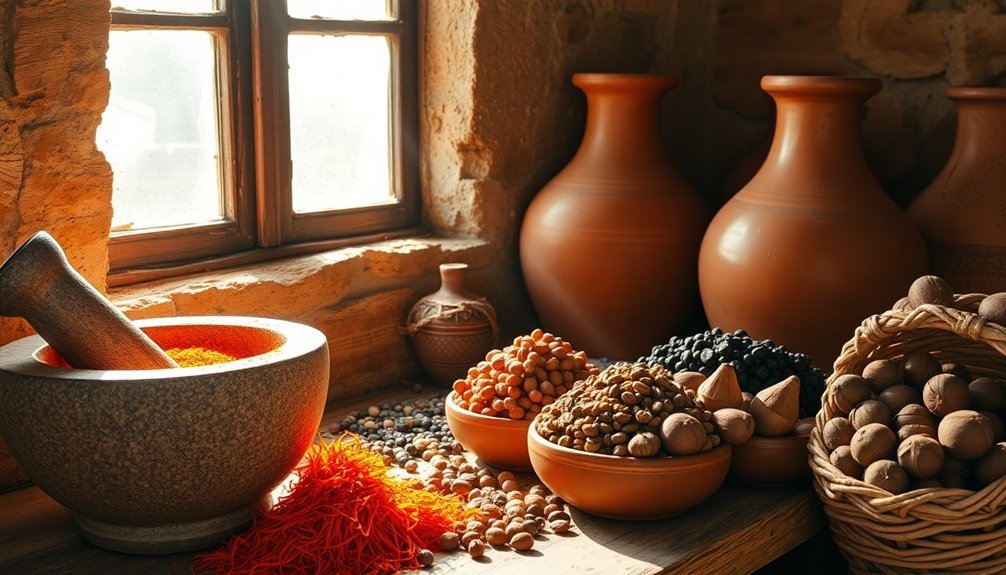
Skilled artisans transform raw Mediterranean spices into culinary treasures through a series of precise processing methods. You'll find that each spice undergoes specialized cleaning procedures that preserve its essential oils while removing impurities. The cleaning process is carefully tailored to maintain the unique flavor profiles that make Mediterranean spices so distinctive.
The artisanal process involves four critical stages that determine the final quality of your spices:
- Sun-drying in open fields or shade-drying for delicate spices like saffron, allowing natural elements to impart subtle flavor notes
- Roasting in specialized chambers to intensify aromas and release volatile oils
- Precision milling using both traditional and modern equipment to achieve the perfect texture
- Custom grinding techniques that reveal trapped flavors and extend shelf life
You'll notice that expert spice artisans carefully monitor each step, particularly during roasting, to prevent scorching. They'll adjust drying times and temperatures based on specific spice characteristics, ensuring the best moisture reduction without compromising flavor.
When you're working with properly processed Mediterranean spices, you're experiencing centuries-old techniques refined by modern precision.
Historical Storage Containers
Throughout history, Mediterranean civilizations developed sophisticated containers to preserve their precious spices, reflecting both practical needs and cultural significance. You'll find that ancient Romans used ornate boxes crafted from wood, metal, or ceramic, demonstrating the high value they placed on these aromatic treasures.
The choice of materials wasn't random – each served a specific purpose. Clay containers, popular in ancient Egypt, were prized for their porous nature that kept spices dry and fresh when stored in cool, dark places.
If you'd visited a medieval European household, you'd have discovered spices secured in locked chests with multiple compartments, protecting these valuable commodities from theft.
You can still see the influence of these historical storage methods today. The containers weren't just functional; they were often works of art featuring intricate carvings, decorative motifs, and elegant craftsmanship.
In wealthier households, you'd have found silver containers, valued for their antimicrobial properties, especially for storing precious spices like saffron and cardamom.
These storage solutions weren't just containers – they were sophisticated systems that helped preserve spices' potency while reflecting the cultural significance of these prized ingredients.
Mediterranean Climate Storage Benefits
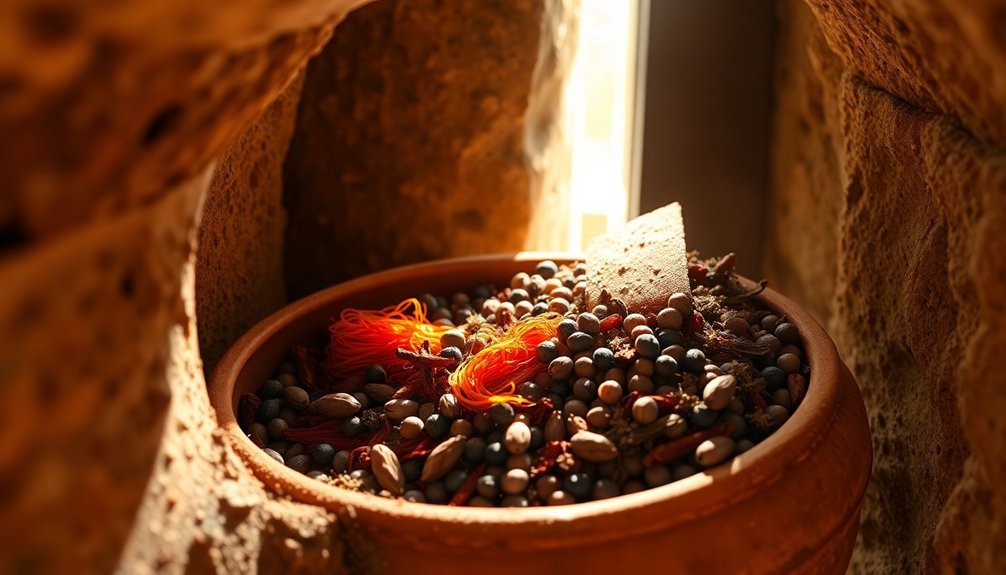
You'll find that the Mediterranean climate offers natural advantages for storing spices, with its desert-like air keeping moisture levels naturally low and helping prevent spoilage.
Hot regional winds, like the sirocco and mistral, work as natural dehumidifiers, maintaining ideal storage conditions that protect your spices from clumping and degradation.
The coastal areas' moderate temperatures, typically hovering around the perfect 20°C (70°F), combine with lower humidity levels to create nearly perfect storage conditions for preserving your spices' flavors and aromas.
Desert Air Preserves Spices
Mediterranean desert air serves as nature's perfect spice keeper, offering unique preservation benefits that have made the region famous for its aromatic treasures.
You'll find that the naturally low humidity levels in these areas create ideal conditions for maintaining your spices' potency and preventing common storage problems like clumping or mold growth.
The region's stable temperatures and dry climate work together to protect your spices' essential oils, which are responsible for their distinctive flavors and aromas.
When you store spices in Mediterranean conditions, you're taking advantage of nature's preservation system that includes:
- Cool nights and dry days that concentrate essential oils, especially in precious spices like saffron
- Minimal moisture absorption that prevents oxidation and maintains spice integrity
- Natural temperature stability that inhibits bacterial and mold growth
- Dry air that keeps spices from clumping together
You'll notice that these conditions are particularly effective when combined with proper storage techniques.
Using airtight glass containers and keeping your spices away from direct sunlight allows you to maximize the preservative benefits of the Mediterranean desert air, ensuring your spices remain potent and flavorful for extended periods.
Hot Winds Minimize Moisture
Among the desert air's preservative qualities, hot winds play a powerful role in maintaining spice freshness across the Mediterranean region. These warm currents actively reduce moisture levels in the environment, creating ideal conditions for spice preservation. When you're storing spices in Mediterranean climates, you'll benefit from the natural combination of hot summers and mild winters that help keep your seasonings dry.
You'll need to work with these climate conditions by storing your spices in appropriate containers. Choose airtight ceramic, aluminum, or stainless steel containers, or opt for dark brown glass jars that block out light. When you're handling spices, always use dry utensils to prevent introducing moisture that could compromise their quality.
The hot winds' moisture-reducing effects help prevent your spices from clumping and developing mold, while also preserving their essential oils and flavors. You can maximize these benefits by maintaining indoor humidity levels between 40-60% – use a hygrometer to monitor this.
Keep your spice containers away from cooking areas and heat-generating appliances, as these can create unwanted moisture pockets that counteract the beneficial effects of the Mediterranean climate.
Coastal Storage Advantages
Located along the Mediterranean coastline, spice storage benefits from a unique combination of mild temperatures and low humidity levels. You'll find that these coastal areas maintain temperatures between 10°C and 30°C, with an ideal sweet spot around 20°C, creating perfect conditions for preserving your spices' flavors and aromas.
The coastal Mediterranean climate offers several distinct advantages for spice storage:
- The region's naturally low humidity levels (40-60%) prevent moisture absorption and clumping, keeping your spices dry and free-flowing.
- Consistent temperatures along the coast help maintain spice quality by avoiding damaging fluctuations.
- Sea breezes and coastal air circulation promote natural ventilation in storage areas.
- The abundance of traditional storage options, like ceramic containers and glass jars, complements the climate's preservation properties.
To maximize these coastal benefits, you'll want to store your spices in airtight glass containers or ceramic vessels.
While the Mediterranean climate provides excellent natural conditions, you should still keep your spices away from direct sunlight. If you're using clear glass containers, place them in dark cabinets or use dark brown glass to protect against sun exposure, which can degrade both flavor and color.
Traditional Harvesting Wisdom
Generations of skilled harvesters have perfected the art of gathering Mediterranean herbs at their peak flavor and potency. You'll want to follow their time-tested wisdom by harvesting your herbs during warm, sunny mornings after the dew has dried but before intense heat sets in. This timing guarantees the highest concentration of essential oils, which give Mediterranean spices their distinctive flavors.
You'll achieve the best results by cutting herbs just as their flower buds form, though mints are an exception – they're most flavorful when in full bloom. Using clean, sharp scissors, cut just above a growth node, removing about one-third of perennial herbs' top growth. For annuals, you can cut more aggressively, leaving 4-6 inches of stem.
Once harvested, give your herbs a light rinse if needed, then shake off excess moisture. Bundle the stems and hang them upside down in a dark, dry location. You might want to wrap them in perforated paper bags to catch any falling leaves.
After they're completely dry and the stems become stiff, remove the leaves and store them in airtight containers away from sunlight to preserve their Mediterranean essence.
Sustainable Preservation Practices
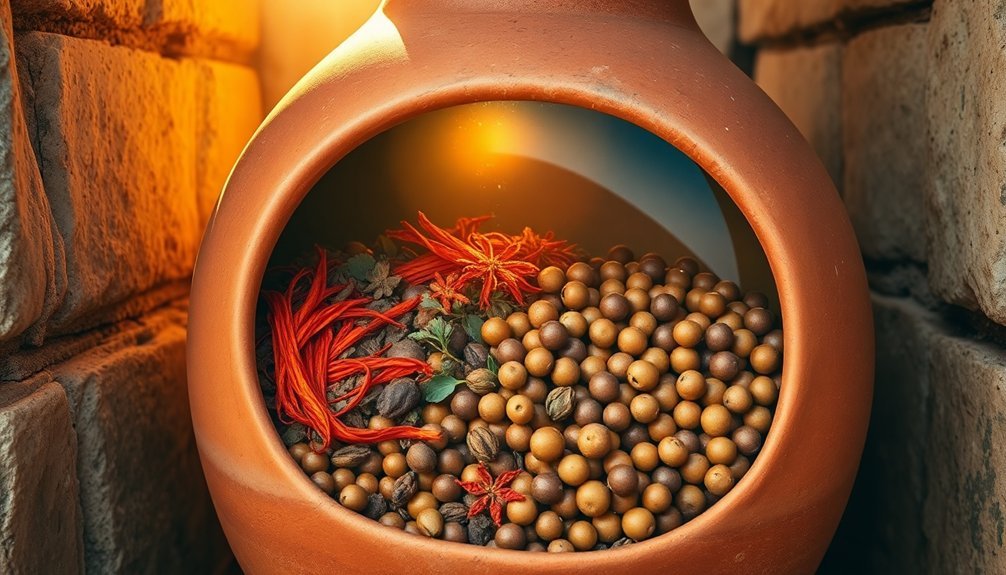
When preserving Mediterranean spices, you'll need to embrace sustainable practices that protect both flavor and environmental resources. Start by storing your spices in airtight containers made of glass or stainless steel, keeping them in cool, dark places to prevent degradation from heat and light.
You'll want to label each container with purchase dates and use dry utensils to maintain freshness.
Natural preservation methods are key to maintaining the authentic character of Mediterranean spices. Consider these time-tested techniques:
- Salt brining and packing to create protective barriers against moisture
- Natural antimicrobials like cloves and black pepper to prevent contamination
- Fermentation processes that enhance flavors while extending shelf life
- Proper inventory management to guarantee ideal freshness
For the best results, buy smaller quantities of spices and store whole spices separately from ground ones, as they retain their natural oils longer.
Remember to check your spices regularly by rubbing them between your fingers to test their potency. If you're working with fresh herbs, store them in your refrigerator, while dried varieties should stay in cool, dry spaces with proper ventilation.
Ancient Trading Preservation Methods
Ancient Mediterranean traders developed ingenious methods to preserve their valuable spices during long sea voyages. You'll find that they primarily relied on drying and grinding techniques, but they'd only grind what they needed to maintain maximum freshness.
When you examine their methods, you'll notice they understood that whole spices lasted considerably longer than pre-ground ones. These traders would toast their spices in hot skillets before grinding, a technique that not only enhanced flavors but also helped eliminate moisture that could lead to spoilage.
You'll discover they were meticulous about storage, keeping spices away from air, heat, and sunlight during their journeys from Asia to Europe. They'd often use oils and fats to infuse and preserve spice flavors, a practice that proved particularly effective during extended sea voyages.
From the Romans to the Greeks, you'll see how these preservation methods became standardized across the Mediterranean. They'd employ multiple techniques like salting, pickling, and preserving in honey to guarantee their precious cargo remained viable.
These methods weren't just practical; they were essential for maintaining the economic value of spices, which often rivaled gold in worth.
Frequently Asked Questions
Can Mediterranean Spices Be Stored in Plastic Containers Long-Term?
You shouldn't store spices long-term in plastic containers since they can absorb flavors and allow contamination. Instead, you'll want to use glass or ceramic containers with airtight seals for best preservation.
Do Mediterranean Spices Lose Nutritional Value Faster in Humid Environments?
Yes, you'll find your spices lose nutritional value more quickly in humid environments. Moisture accelerates essential oil degradation and triggers oxidation, which breaks down beneficial compounds. It's best to store them in dry conditions.
Which Modern Appliances Best Replicate Traditional Mediterranean Spice Storage Conditions?
You'll best replicate ideal spice storage with a wine cooler or mini-fridge set to low humidity, while vacuum sealers and moisture-absorbing ceramic containers help maintain the dry, cool conditions your spices need.
How Do Electromagnetic Fields From Kitchen Appliances Affect Spice Preservation?
You won't notice direct effects from electromagnetic fields on your spices, but you'll want to keep storage areas away from appliances to maintain ideal temperature and humidity levels for preservation.
Can Artificial Lighting in Modern Kitchens Degrade Mediterranean Spices Differently Than Sunlight?
Yes, your Mediterranean spices will degrade differently under artificial lights versus sunlight. While sunlight causes faster degradation due to intense UV rays, artificial lighting's lower UV levels will still affect them more gradually.
In Summary
You'll find that Mediterranean spices' remarkable longevity comes from centuries of refined preservation techniques, perfectly matched with the region's dry climate. When you combine traditional harvesting methods, proper storage practices, and the natural antimicrobial properties of these spices, you're tapping into ancient wisdom that's still relevant today. Following these time-tested practices, you can maintain your spices' potency and flavor for years to come.
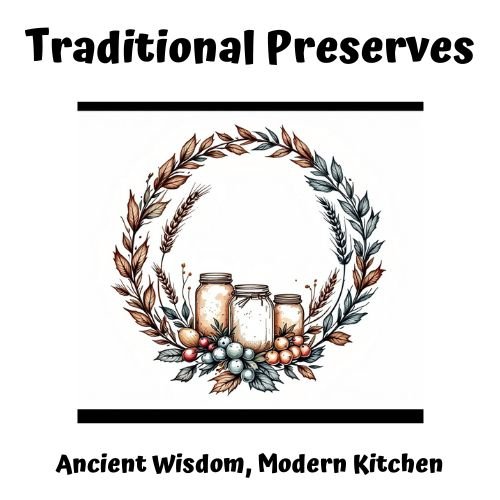
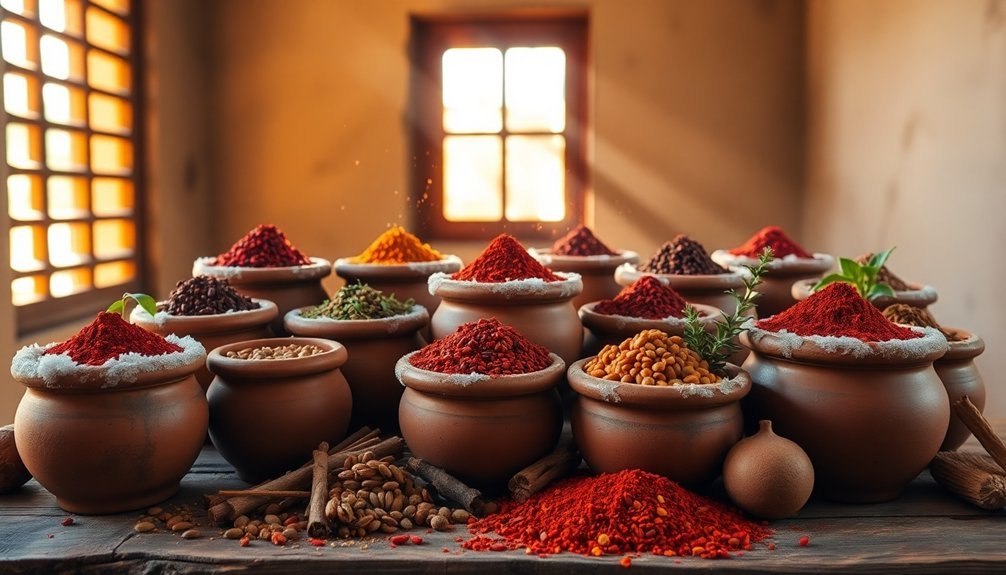
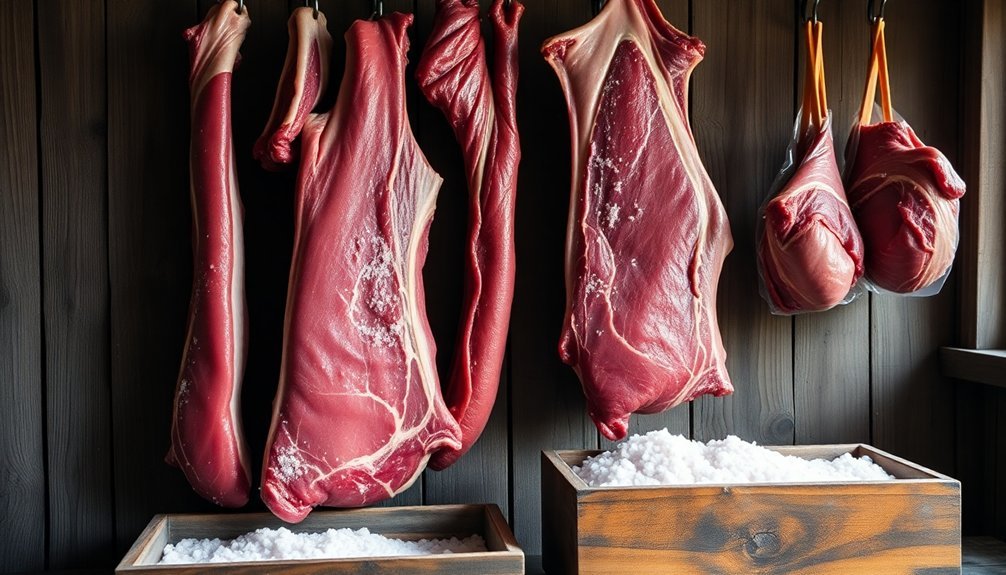
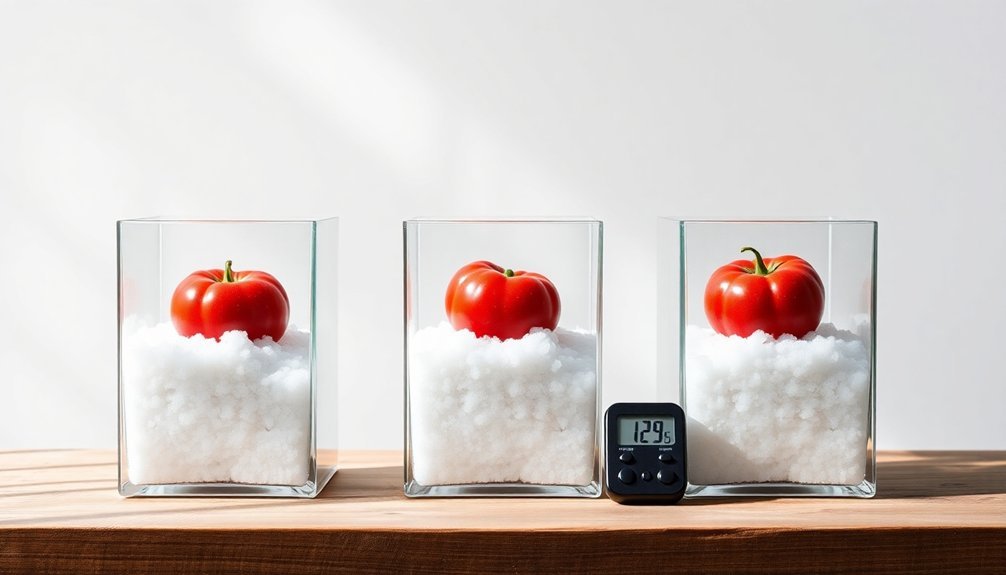
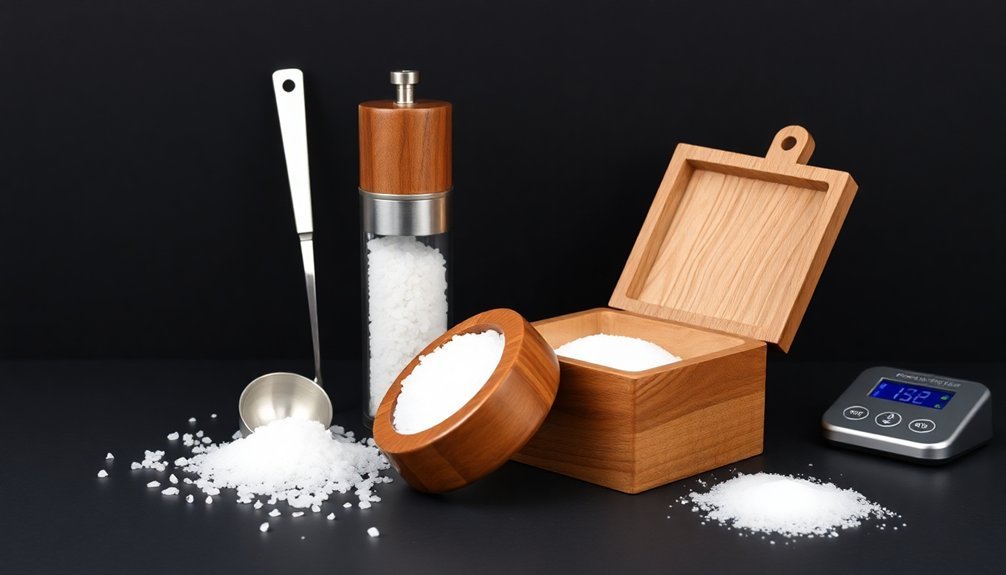
Leave a Reply